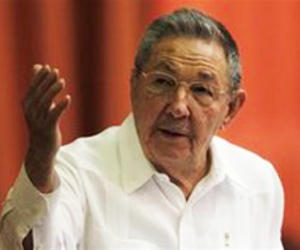Cuba congress embraces, refines Raul Castro reforms
- Submitted by: manso
- Politics and Government
- 04 / 18 / 2011

By Jeff Franks Jeff Franks. HAVANA (Reuters) – Cuba's Communist Party congress suggested refinements to President Raul Castro's wide-ranging national reforms in weekend meetings, but generally embraces his overhaul of the ailing Cuban economy, state-run media reported on Monday.
The 1,000 delegates met in five separate commissions on Sunday where they backed Castro's proposals to slash government jobs, cut the universal monthly food ration, encourage more private initiative and take other steps to boost productivity while maintaining central planning.
The panels would present their findings to the congress on Monday afternoon, Communist Party newspaper Granma said. Approval seemed certain for the reforms to what is one of the last one-party communist states of its kind in the world.
State media accounts did not indicate any dissent to President Castro's plan, but said a number of proposed reforms had been added to the 311 being considered by the congress.
The congress must elect new leadership for Cuba's highest political body and only legal political party before the meeting ends on Tuesday. The election will be closely watched for up-and-coming new party bosses to replace aging leaders.
Former leader Fidel Castro, 84, who handed over the presidency in 2008 to his younger brother Raul, 79, chimed in with his support in a front page column in Granma, saying he had listened in on Sunday's meetings and was impressed.
"The new generation is called to rectify and change without hesitation all that must be rectified and changed, and to continue demonstrating that socialism is also the art of making the impossible happen," he said.
He described "the impossible" as "building and bringing about the revolution of the poor, by the poor and for the poor, and defending it for half a century from the most powerful military power that ever existed," referring to the United States. This is a long-standing maxim of the nationalist Cuban Revolution that Fidel Castro led in 1959.
Fidel Castro did not attend the congress opening. Foreign media were not allowed in to the Sunday sessions.
JOBS, HOMES, FOOD RATION
The commissions focused on broad topics like the need to build a better business culture and specifics such as taxation for Cuba's more than 200,000 newly self-employed.
They endorsed a proposal that tax rates be reviewed periodically and suggested that they be adjusted locally so as not to be too burdensome in areas of low economic activity.
The need to get more young people into agriculture was discussed and there were suggestions that more vacant land be used to create jobs. In the last two years, more than 113,000 Cubans have leased land to grow crops as Cuba tries to reduce budget-draining food imports.
The commissions backed reforms to increase sugar production, which has steadily declined, but said the plan should include money to keep aging sugar mills in good repair.
A lack of construction materials was cited in a discussion on a shortage of housing and deterioration of existing homes.
What Granma described as a "tense" housing situation could be eased by encouraging more people to go into construction by making it more profitable and by providing loans to private contractors, the commissions said.
They supported a proposal to allow the buying and selling of homes, and to make it easier to do house swaps, a change sure to be warmly welcomed by ordinary Cubans.
The commission discussing the fate of the food ration backed President Castro, who said on Saturday the ration given all Cubans since 1963 had become an "unsupportable burden" for the state and must be cut out for those who do not need it.
The "libreta" ration book is one of the trademark features of the paternalistic socialist system that President Castro is seeking to make more efficient.
Castro's plan to cut more than 1 million government jobs over the next few years, "without hurry but without pause" as he said on Saturday, was also endorsed.
Among other topics discussed were construction of golf courses and marinas to improve tourism and allowing small, private mining operations.
While Castro wants to ease the grip of the state, delegates made clear it would not disappear. They endorsed a planned economy and the country's principal means of production remaining in state hands.
Source: http://news.yahoo.com/s/nm/20110418/
Comments